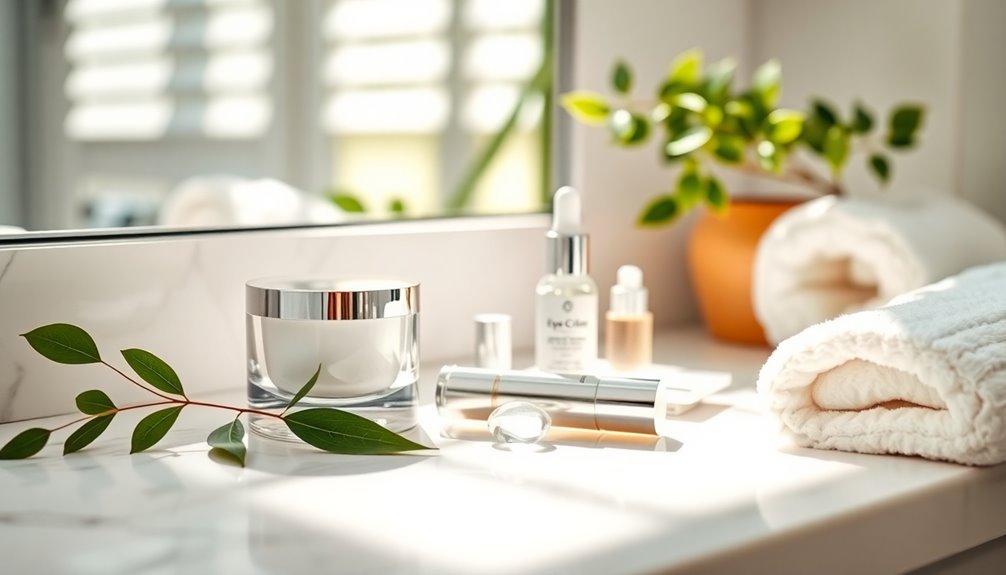To treat dark circles effectively, focus on a few key strategies. Maintain a consistent sleep schedule and stay hydrated daily. Incorporate vitamin C and peptides into your skincare for brighter, rejuvenated skin. Consider eye creams with caffeine for better circulation. For faster results, explore cosmetic options like fillers or laser treatments. Don’t forget about home remedies like cold compresses or cucumber slices, and keep skin protected with SPF. There’s a lot more you can learn about tackling dark circles!
Key Takeaways
- Address underlying causes like genetics, sleep deprivation, and allergies for effective dark circle treatment.
- Incorporate topical treatments with Vitamin C, peptides, and caffeine to brighten and rejuvenate the skin.
- Maintain a healthy lifestyle through hydration, balanced nutrition, and regular exercise to prevent dark circles.
- Explore cosmetic procedures such as fillers, laser resurfacing, or chemical peels for significant improvement.
- Utilize home remedies like cold compresses and cucumber slices for temporary relief and soothing effects.

If you’ve ever looked in the mirror and noticed dark circles under your eyes, you’re not alone. Many people struggle with this common issue, which can stem from genetics, poor sleep, dehydration, allergies, and even UV exposure. Understanding these underlying causes is the first step in tackling dark circles effectively.
Lifestyle changes can significantly impact the appearance of dark circles. Maintaining a consistent sleep schedule helps reduce puffiness and promotes overall skin health. Staying hydrated is crucial too; drinking enough water keeps your skin plump and fresh. Additionally, thin skin around the eyes makes hyperpigmentation more noticeable, which can exacerbate the appearance of dark circles.
Eating a balanced diet rich in vitamins and minerals can improve your skin’s appearance, while regular exercise boosts circulation, giving you that healthy glow. If allergies are a concern, reducing exposure to allergens can alleviate puffiness and discoloration.
For immediate treatment, topical options can be highly effective. Products containing Vitamin C brighten the skin, while ingredients like azelaic acid or hydroquinone can lighten dark pigmentation.
Eye creams infused with caffeine or peptides enhance blood circulation and firm skin, making them great for combating dark circles. Moisturizing regularly also helps improve skin texture and light reflection.
If you’re looking for more dramatic results, cosmetic procedures might be the answer. Under-eye fillers can help reduce hollowness, while chemical peels exfoliate and allow deeper penetration of treatments.
Laser resurfacing stimulates collagen production, tightening the skin and rejuvenating the area. Radiofrequency treatments can also promote collagen formation, providing long-lasting results.
At home, simple remedies like cold compresses or chilled cucumber slices can temporarily soothe puffiness. Makeup can conceal dark circles, giving you a quick fix.
Remember, consistency is key—stick to your skincare routine and treatments for the best long-term results. And don’t forget to protect your skin from UV damage with SPF and sunglasses.
Frequently Asked Questions
Are Dark Circles Hereditary or Caused by Lifestyle Factors?
Dark circles can be both hereditary and influenced by lifestyle factors. If your family has a history of dark circles, you might be more prone to them.
On the other hand, lack of sleep, dehydration, and stress can worsen their appearance. It’s important to recognize that both genetics and daily habits play a role.
Can Allergies Contribute to the Appearance of Dark Circles?
You might think dark circles are solely due to lack of sleep, but allergies play a significant role too.
When you experience allergies, inflammation and fluid accumulation around your eyes can make dark circles more pronounced. Rubbing your eyes exacerbates the issue, leading to further irritation and visible blood vessels.
Do Certain Foods Worsen Dark Circles Under the Eyes?
Yes, certain foods can definitely worsen dark circles under your eyes.
Salty snacks lead to fluid retention, causing puffiness.
Dairy might trigger digestive issues, resulting in inflammation.
Processed and fried foods can increase inflammation, making dark circles more pronounced.
Additionally, a high sugar intake can exacerbate skin inflammation.
To help reduce dark circles, focus on a balanced diet and limit these problematic foods for healthier-looking skin.
Is There a Specific Age When Dark Circles Become More Noticeable?
You might’ve noticed dark circles creeping in around age 24, and you’re not alone.
Many people experience this change as they transition into adulthood. It’s interesting how these shadows can become more pronounced with age, especially between 18 and 59.
Factors like sleep, stress, and lifestyle choices can play a role too.
Fortunately, as you age past 60, those dark circles often start to fade away, bringing some relief.
Can Stress Impact the Severity of Dark Circles?
Yes, stress can definitely impact the severity of dark circles.
When you’re stressed, blood flow to your skin can become irregular, leading to darkened under-eye areas. Increased inflammation and hormonal changes from stress can worsen puffiness and discoloration.
Plus, stress often affects your sleep quality, making those circles even more pronounced.
Conclusion
In the battle against dark circles, consistency is your best ally. By incorporating the right skincare routine and lifestyle changes, you can brighten up your under-eye area like a sunrise chasing away the night. Remember, it’s not just about looking good; it’s about feeling confident in your skin. So, embrace these dermatologist-approved treatments, and watch those dark circles fade like a distant memory. You’ve got this!









